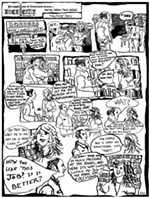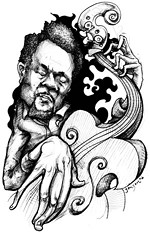A Cultural Imperative
By Harvey Pekar, Fri., Dec. 18, 1998
|
|
During Koester's stay in St. Louis, he met a number of local musicians who later appeared on his label: Bob Graf, a veteran of Woody Herman's band; another Mound City tenor saxophonist, Jimmy Forrest, who played with Andy Kirk and had a big R&B hit with "Night Train," cut a jazz LP with Elvin Jones and the then-unknown guitarist Grant Green; alto saxman Chris Woods, another fine St. Louis cat, never made a national name, but happily Koester issued stuff by him. Big Joe Williams was yet another major St. Louis-based bluesman that Koester recorded.
In 1958, Koester moved his operation to Chicago, where he bought Seymour's Jazz Record Mart, which eventually became known as the Jazz Record Mart, one of the most well-known retail jazz record stores in the nation. Koester followed the example of labels like Musicraft, Keynote, and Commodore, which also owned retail stores, and understood that one enterprise could support the other during lean times. Once settled, Koester documented the music scene in Chicago as he had in St. Louis.
The mainstream jazz movement at that time was post-bop. Among the local post-boppers to appear on Delmark were multi-instrumentalist Ira Sullivan, highly regarded in Chitown and also briefly a member of Art Blakey's Jazz Messengers. The great tenorman Johnnie Griffin appeared on one of Sullivan's albums, the promising saxophonist Nicky Hill on another. Other Delmark post-bop LPs were cut by Chicago pianists John Young and Jodie Christian, and guitarist George Freeman, with his "legendary" brother Von on tenor. Koester has also put stuff out by internationally famed boppers and post-boppers Sonny Stitt, Bud Powell, Donald Byrd, and Wynton Kelly.
|
|
At that time, Chicago's AACM (Association for the Advancement of Creative Musicians) had a leading role on the cutting edge of jazz. The free jazz movement began around 1960, when the recordings of Ornette Coleman began having an impact. Initially, many free jazz recordings, on which improvisation was not based on pre-set foundations such as chord progressions, could get monotonous and repetitive. AACM members, however, began bringing new structures to free jazz. Anthony Braxton didn't go back to playing "I Got Rhythm" and blues changes, but placed a new emphasis on composition and not letting performances get out of hand; his composing was quite influential. The Art Ensemble of Chicago, containing trumpeter Lester Bowie and woodwind players Joseph Jarman and Roscoe Mitchell, mixed their music with theatrical elements. Koester recorded them all, as well as other new artists like Muhal Richard Abrams and Kalaparusha Maurice McIntyre, who had an impact internationally.
It seems strange that Koester, who was such a big fan of traditional jazz, would record so much experimental stuff, but his explanation for why he did it is quite candid.
"That was pretty much a business decision," he says. "I knew that every era had its own developments in jazz. I couldn't record Louis and Jelly [Roll Morton], one was dead and the other was beyond my means. Delmark's equivalent to Armstrong's King Oliver work is the AACM recordings. I didn't feel it was better, because it was new, but I didn't think it was worse either just because it was different."
Koester credits some associates of his with helping persuade him to record the AACM.
"Chuck Nessa moved to Chicago in 1966 to manage the store," recalls Koester. "He, Terry Martin, John Litweiller, and Jerry Figi served on the unpaid advisory board that encouraged me to record the new AACM jazz, which was seriously over my head. At a time when the blues albums paid their own way, it wasn't the obvious move, but I sensed a cultural imperative."
|
|
During the Sixties, though, as the music continued to evolve, Delmark became arguably the major blues label. The company issued recordings by Magic Sam, Jimmy Dawkins, Otis Rush, and Luther Allison, all of whom played more complex, jazz-like solos than most blues guitarists of earlier decades. Magic Sam, also a superb singer who exhibited some gospel influence, made a couple of magnificent Delmark recordings, West Side Soul and Black Magic. Harmonica man Junior Wells cut a memorable LP, South Side Soul, with another guitar great, Buddy Guy, and Otis Spann, considered by some to be the premier post-war blues pianist. Another top harmonica man, Carey Bell, who does some unique single-note line work, also recorded for Koester.
Rural blues styles are also a specialty of Delmark. In addition to Big Joe Williams, Koester has issued albums by Sleepy John Estes, mandolinist Yank Rachell, and Arthur "Big Boy" Crudup. The outstanding blues shouter Eddie "Cleanhead" Vincent, who came to the fore with Cootie Williams' big band, can be heard on Delmark's Kidney Stew Is Fine.
Koester continues to issue albums by young jazz and blues artists, though some are revivalist or retro performers. Happily, he's still steadily reissuing his earlier material on CD. The latest batch contains three albums he originally produced and five CDs full of material he acquired, mostly stuff originally issued on United, a black-owned label that operated from 1951-57. Mandolin Blues by Yank Rachell reunites the mandolinist with some of his associates from the Twenties and Thirties: nine-string guitarist Big Joe Williams, guitarist Estes, and harmonica player Hammie Nixon. Cut in 1963, it finds the veteran performers still full of vigor; they're joined on some tracks by an up-and-coming youngster, Mike Bloomfield.
Fast Fingers, cut in 1968-69, was Jimmy Dawkins' first album and may be his best. He's joined by a stellar cast including guitarist Mighty Joe Young, tenorman Eddie Shaw, and pianist Lafayette Leake. Dawkins' technically impressive guitar work and somber vocals stand out. Mighty Joe Young and Dawkins also appear together on Blues With a Touch of Soul, but here Young's the leader. A solid, creative performer, he was an important figure in the Chicago blues scene from the Fifties through the Seventies, and was well-admired by other musicians, including Dawkins, who called him Chicago's best guitarist. This CD is a reissue of his first LP, cut in 1970. If you're a serious electric blues collector, you'll want to have it.
|
|
Doug Engel, Delmark's director of publicity, says these kind of reissues are the label's strong point.
"Delmark tends to be more of a catalog-oriented label," he explains. "We're not attempting to make hit records. We want to make records that sound good to us by artists that we like. We consider ourselves art dealers in that we make records that may not be appreciated instantly, but over time their value will be revealed."
Delmark has been around for 45 years, and has just issued a 2-CD anthology drawn from its catalog, Forty Five Years of Jazz and Blues. Koester's longevity as an independent record producer is amazing. Small labels like Delmark are vitally important in today's music scene, because they put out work by unknown artists that the big labels won't risk taking a risk on. In the process, they've discovered a huge number of outstanding singers and instrumentalists, who, ironically, often leave them when they develop a degree of popularity. That must be a kick in the teeth for guys like Koester, but they know it's inevitable and keep on keepin' on, constantly on the lookout for new talent. These are the guys that need to be honored at Grammy presentations.












